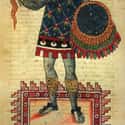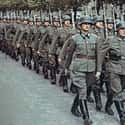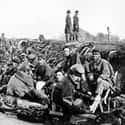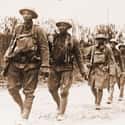-
(#6) Ancient Mayans May Have Carried Out Conflicts In The Name Of Tlaloc, The Mushroom God
Archaeologist Dr. Stephan F. de Borhegyi found evidence suggesting mushroom rituals were a focal point of Mayan religion. According to de Borhegyi, around the year 1000 BC, a group arose that appeared to worship mushrooms. The group associated mushrooms with various rituals, and some historians believe they carried out full-scale conflicts in the name Tlaloc, the god most commonly associated with mushrooms.
Tlaloc was most often depicted with bulging eyes, a handlebar mustache, and jaguar fangs, possibly because his depictions were made by devotees using psychedelic mushrooms. Borhegyi believed ancient Mayans kept this mushroom powder in jars and imbibed it through various means. Historical precedent for the theory of Mayan mushroom soldiers is found in the work of Fray Bernardino Sahagun, a Spanish writer who described Aztecs using mushrooms in a similar way.
-
(#1) The Wehrmacht Were Given 'Crystal' Pills
When the might of the Germans was unleashed on the world during WWII, a new term was coined to describe their speed and efficiency: "blitzkrieg," or "lightning war." At the time of Germany’s 1939 invasion of Poland, the Wehrmacht was viewed with such fear that they were considered to have superhuman stamina and strength, and a willingness to fight without hesitation.
The basis for that reputation was a medication called Pervitin, which was widely used in German society as a way to increase energy. On the battlefield, it helped soldiers go for abnormally long periods of time without eating or sleeping, while also keeping their spirits up in spite of the conditions around them.
-
(#4) Young Soldiers In West Africa Had Access To 'Brown Brown'
If you were to imagine the most harrowing existence possible, it'd be hard to imagine something worse than the fate of extreme young soldiers. Throughout the world, small squads of young boys - mostly orphans whose parents were slain in whichever conflict drew them in - are handed arms and told to fight for their country.
In the 11-year-long civil conflict in Sierra Leone that began in 1991, child soldiers were given a substance called "brown brown" to increase the intensity of their fighting and keep them loyal to whichever faction had them in their thrall. "Brown brown" is a potent mix of cocaine and gunpowder. Former child soldier Ishmael Beah wrote in The New York Times:
We [used cannabis] and sniffed "brown brown," which was always spread out on a table near the [arms] hut, and of course I took more of the white capsules, as I had become [dependent on] them. The first time I took all these [substances] at the same time, I began to perspire so much that I took off all my clothes. My body shook, my sight became blurred and I lost my hearing for several minutes. I walked around the village restlessly. But after several doses... all I felt was numbness to everything and so much energy that I couldn't sleep for weeks.
-
(#9) Many Civil War Vets Became Dependent On Hardcore Substances
The American Civil War was a dark point in American history. Most are aware that it was one of the costliest military events in the country’s history, thanks to the ingenuity of the modern age and its technology bashing headlong into the tactics of a bygone era. It was foolish to walk in formation, for example, when the enemy was equipped with a fully operational Gatling device.
Doctors were also behind the times. Field medics struggling to keep their charges comfortable ended up liberally administering morphine to the troops. Beyond battlefield ailments, it was given to troops to treat more or less everything, including diarrhea. In the Union Army, doctors issued more than 10 million doses of it during the conflict. To put that in context, 2.75 million soldiers fought for the Union. Historians estimate that at least 200,000 morphine addicts were created by 1900 as a result of the conflict.
-
(#10) In WWI, American Soldiers Were Given Cigarettes To Calm Their Nerves
Prior to 1917, when America entered WWI, smoking habit-forming cigarettes was considered something of an upper-crust activity. In fact, tobacco was primarily imbibed through pipes. As American soldiers were shipped off to the European front, however, they were issued hand-rolled options. The prevailing theory was that smoking would calm a soldier’s nerves before heading into battle. During the conflict, doctors gave them to wounded soldiers, telling them it would help with their discomfort.
They became standard issue for other national armies. In both Canada and England, nationwide fundraisers were held just to buy and send cigarettes to the troops during WWI. By the end of the conflict, Phillip Morris had headquarters in New York City and England. During this period, tobacco advertising exploded. Soldiers found cigs much less costly and much easier to use on the go, so they carried their habit home with them after the fighting was finished. Soldiers dependent on tobacco during WWI carried their habit into WWII, and governments followed suit, providing them in rations.
-
(#3) Roman Soldiers Were Rationed Wine Every Day
In ancient Rome, citizens and slaves alike consumed an estimated three liters of wine a day, meaning everybody was at least a little inebriated all of the time. For low or high classes, there was basically no stigma associated with dependency. And everybody consumed.
Since science was in its infancy, the popular belief was that Roman wine was medicinal. As such, Roman soldiers were rationed wine every day. The rations were meant to boost morale and help keep the soldiers' energy up in time of duress and near exhaustion.
New Random Displays Display All By Ranking
About This Tool
Our data comes from Ranker, If you want to participate in the ranking of items displayed on this page, please click here.






